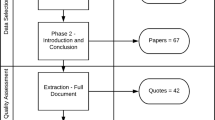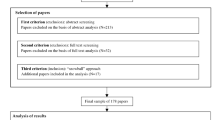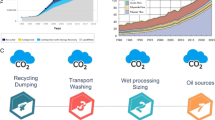Abstract
The choice of new technology in a resource-based industry has far-reaching implications for its ethical performance. The kraft pulping industry uses considerable amounts of wood as raw material, and regulatory agencies have been tightening their control limits for effluent, solid waste and air emissions. The technological solutions required to reduce the environmental impact of the industry are shown to have the potential of causing social hardship for the mill's employees, the affected communities, lenders, and owners. In some instances, the technological solutions give rise to new environmental challenges. Forestry practices are influencing the public's perception of the kraft pulping industry, its ethical and environmental performance, its profitability, and the properties of its product, which may increase wood requirements. New forestry practices have the potential to reduce the forest land area required to sustain the kraft pulp production at a given level but ethical problems associated with genetic manipulation, phenodiversity, and biodiversity are identified. This paper analyzes the interface between environmental protection, ethics, and choice of technology.
Similar content being viewed by others
References
Abernathy, W. and K. Clark: 1985, ‘Innovation: Mapping the Winds of Creative Destruction’, Research Policy 14, 3–22.
American Forest and Paper Association: 1994, Agenda 2020: A Technology Vision and Research Agenda for America's Forest, Wood and Paper Industry (Washington, District of Columbia).
Astley, G. and A. van de Ven: 1983, ‘Central Perspectives and Debates in Organization Theory’, Administrative Science Quarterly 28, 245–273.
Barley, S.: 1990, ‘The Alignment of Technology and Structure Through Roles and Networks’, Administrative Science Quarterly 35, 61–103.
Carroll, A.: 1979, ‘A Three-Dimensional Conceptual Model of Corporate Performance’, Academy of Management Review 4, 497–505.
Davis, K. and R. Blomstrom: 1975, Business and Society: Environment and Responsibility (McGraw-Hill, New York).
DiMaggio, P. and W. Powell: 1983, ‘The Iron Cage Revisited: Institutional Isomorphism and Collective Rationality in Organizational Fields’, American Sociological Review 48, 147–160.
Fensham, P. and D. Hooper: 1964, The Dynamics of a Changing Factory (Tavistock, London).
Fine, G. and S. Kleinman: 1979, ‘Rethinking Subculture: An Interactionist Analysis’, American Journal of Sociology 85, 1–20.
Friedman, M.: 1970, ‘The Social Responsibility of Business Is the Increase of its Profits’, New York Times Magazine.
Fritzsche, D.: 1991, ‘A Model of Decision-Making Incorporating Ethical Values’, Journal of Business Ethics 10, 841–852.
Glick, W.: 1985, ‘Conceptualizing and Measuring Organizational and Psychological Climate: Pitfalls in Multilevel Research’, Academy of Management Review 10, 601–616.
Granovetter, M.: 1972, ‘The Strength of Weak Ties’, American Journal of Sociology 78, 1360–1380.
Grant, C.: 1991, ‘Friedman Fallacies’, Journal of Business Ethics 10, 907–914.
Hawken, P.: 1993, The Ecology of Commerce (Harper Business, New York).
James, L., W. Joyce and J. Slocum: 1988, ‘Organizations Do Not Cognize’, Academy of Management Review 13, 129–132.
Johnson, A.: 1994, ‘Fitting Together the ECF-TCF Jigsaw’, Appita 47, 243–251.
Krackhart, D.: 1990, ‘Assessing the Political Landscape: Structure, Cognition, and Power in Organizations’, Administrative science Quarterly 35, 342–369.
L'Etang, J.: 1995, ‘Ethical Corporate Responsibility: A Framework for Managers’, Journal of Business Ethics 14, 125–132.
Maines, D.: 1977, ‘Social Organization and Social Structure in Symbolic Interactionist Thought’, Annual Review of Sociology 3, 235–259.
McMillan, S.: 1996, ‘Corporate Social Investments: Do They Pay?’, Journal of Business Ethics 15, 309–314.
Meissner, M.: 1969, Technology and the Worker: Technical Demands and Social Processes in Industry (Chandler, San Francisco).
Noble, D.: 1984, Forces of Production: A Social History of Industrial Automation (Knopf, New York).
O'Donnell, M.: 1993, ‘Economics as Ethics: Bastiat's Nineteenth Century Interpretation’, Journal of Business Ethics 12, 57–61.
Pava, M. and J. Krausz: 1996, ‘The Association Between Corporate Social-Responsibility and Financial Performance: The Paradox of Social Cost’, Journal of Business Ethics 15, 321–357.
Podolny, J. and T. Stuart: 1995, ‘A Role-Based Ecology of Technological Change’, American Journal of Sociology 100, 1224–1260.
Poesche, J.: 1994, Global Investments, and Horizontal and vertical Integration in the Chemical Pulping Industry (Tampere University of Technology, Tampere).
Poole, M. and A. van de Ven: 1989, ‘Using Paradox to Build Management and Organization Theories’, Academy of Management Review 14, 562–578.
Pulpwatch: 1995, 1.
Quinn, D. and T. Jones: 1995, ‘An Agent Morality View of Business Policy’, Academy of Management Review 20, 22–42.
Redclift, M.: 1993, ‘Sustainable Development: Needs, Values, Rights’, Environmental Values 2, 3–20.
Sagoff, M.: 1994, ‘Four Dogmas of Environmental Economics’, Environmental Values 3, 285–310.
Sethi, S.: 1975, ‘Dimensions of Corporate Social Responsibility’, California Management Review 17, 58–64.
Shrivastava, P.: 1995, ‘Ecocentric Management for a Risk Society’, Academy of Management Review 20, 118–137.
Spretnak, C. and F. Capra: 1986, Green Politics (Bear & Comp., Santa Fe).
Starik, M.: 1995, ‘Should Trees Have Managerial Standing? Toward Stakeholder Status for Non-Human Nature’, Journal of Business Ethics 14, 207–217.
Tushman, M. and P. Anderson: 1986, ‘Technological Discontinuities and Organizational Environments’, Administrative Science Quarterly 31, 439–465.
Wood, S.: 1982, The Degradation of Work: Skill, Deskilling, and the Labour Process (Hutchinson, London).
Rights and permissions
About this article
Cite this article
Poesche, J. Business Ethics in the Choice of New Technology in the Kraft Pulping Industry. Journal of Business Ethics 17, 174–489 (1998). https://doi.org/10.1023/A:1005706611576
Issue Date:
DOI: https://doi.org/10.1023/A:1005706611576




